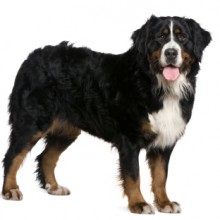Bernese Mountain Dog
Lifestyle Needs

The Bernese Mountain Dog was used as a herding and draught dog in the Swiss mountains and is able to cope with severe cold weather. He is a large dog with a thick, silky coat which will easily become matted if it is not groomed frequently. He is usually a well mannered dog who can be fairly easy to train. Ideally he should live in a large house with a garden and have plenty of exercise daily. Warning: this breed has a relatively short lifespan of around 9 years.
Genetic Diversity
(Known as Coefficient of Inbreeding: 'COI'. It should be as low as possible.)
The UK Kennel Club breed average COI is 5.5% - See 'A Beginners Guide to COI'
Gene Pool Size
(Known as Effective Population Size: 'EPS')
TBC
EPS is a measure of how many individuals are contributing genetically to a breed population. It is a measure of the size of the gene pool in a breed. Lower than 100 is considered critical by conservationists and below 50 brings a breed close to extinction. For more information see the Kennel Club article.
Health and Welfare Problems due to Conformation
(Body shape and physical characteristics)
- The Bernese Mountain Dog’s thick coat will cause him problems unless it is kept regularly groomed. He will not be happy in very warm weather and care should be taken to avoid him becoming too hot.
- The average lifespan for this breed is under 8.4 years.
- Gastric dilatation volvulus (GDV) (Torsion/Bloat)
BVA/KC Health Schemes: www.bva.co.uk/chs
- Hip dysplasia breed 5 year mean score 11.4 (parents should be lower)
- Elbow dysplasia (osteo chondrosis dessicans OCD): score should ideally be O:O
- Eye disease: Progressive Retinal Atrophy (PRA) (annual testing) Full eye testing before breeding
Estimated Breeding Values (EBVs) : EBVs for Hip and Elbow Dysplasia are available for this breed
www.thekennelclub.org.uk/about-ebvs
DNA Tests Available
DogWellNet and IPFD Harmonisation of Genetic Testing for Dogs (HGTD)
www.dogwellnet.com/breeds
- Degenerative Myelopathy (DM)
- Cancer Histiocytic Sarcoma (risk grading test)
Availability of a DNA test does not mean that it is always necessary or even desirable for breeders to use this test.
Other Breed-Specific Health Screening Schemes
- Bitches not to produce a litter under two years of age.
Ask the breeder to show you the certificates for the above tests/screening for both parents. If any of the above tests have not been considered necessary by the breeder (and there may be good reasons), ask her to explain why.
Other Diseases Reported
(For which there are currently no genetic or screening tests for sire or dam)
- Cancers (various)
- Gastro dilatation volvulus (GDV)
- Cranial cruciate ligament rupture
Ask the breeder about the medical history of the parents, grandparents and great grandparents. Consider carefully whether to purchase a puppy if some of these or other diseases are in the family line.
Ask about the breeder’s policy in cases of serious genetic diseases occurring to your puppy in later life. Good breeders will request to be informed of such events in order to improve future breeding decisions.
You are strongly advised to buy from a breeder who uses (or is prepared to use) the AWF Puppy Contract and Puppy Information Pack (PIP): www.puppycontract.org.uk
The breeder should also be familiar with the CFSG/DBRG Code of Practice for Dog Breeding